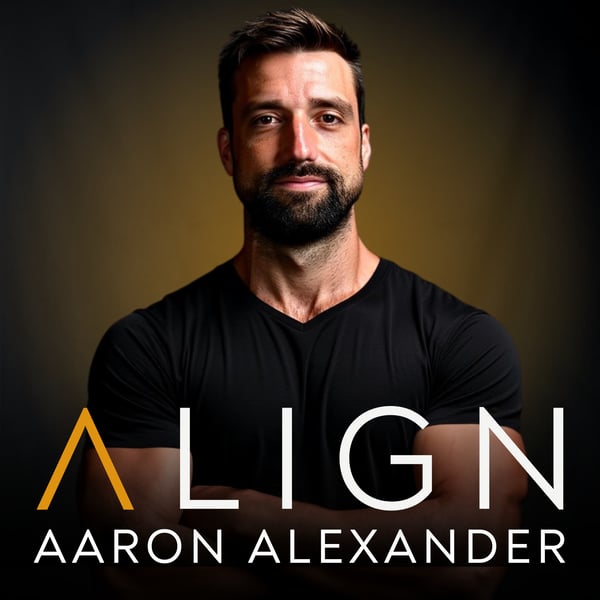3 Ways To Fight The Global Food Crisis | Joel Salatin | Align Podcast #536
Align Podcast
Aaron Alexander
4.8 • 900 Ratings
🗓️ 27 March 2025
⏱️ 62 minutes
🧾️ Download transcript
Summary
Joel Salatin, an American farmer, author, and lecturer, is on a quest to fix our broken food system.
In this episode of the Align podcast, Joel joins us to explore the collapse of industrial agriculture and how we can take back control of our food and health. From regenerative farming to cooking at home, he explains three key actions anyone can take today to achieve food freedom.
OUR GUEST
Joel Salatin and his family operate Polyface Farm in Virginia’s Shenandoah Valley, producing salad bar beef, pigaerator pork, pastured poultry and forestry products. Chemical-free since coming to the property in 1961, the family pastures livestock and hosts some 15,000 visitors per year.
Author of 16 books, Joel is editor of the world’s leading pastured livestock trade journal, The Stockman Grass Farmer, and writes columns in numerous print and electronic publications. He travels the world promoting chemical-free agriculture, food freedom, and profitable farming businesses.
His blog is Musings from the Lunatic Farmer and podcast is Beyond Labels. Polyface has a formal stewardship and apprenticeship program to germinate young farmers.
JOEL SALATIN
🌎 WEBSITE ▶ https://www.polyfacefarms.com
AARON ALEXANDER
📸 IG ▶ https://www.instagram.com/aaronalexander/
🤳 TIKTOK ▶ https://www.tiktok.com/@alignmethod
👉 SUBSCRIBE ▶ https://www.youtube.com/@AlignPodcast?sub_confirmation=1
🌐 WEBSITE ▶ https://www.alignpodcast.com
ABOUT
Aaron Alexander is a pioneering manual therapist and movement coach with over 5 years experience. He is the founder and creator of The Align Method, author of The Align Method book, and host of The Align Podcast which has ranked #1 in Nutrition on Apple Podcasts.
Aaron has worked with some of the world’s greatest professional athletes, performers, and celebrities to help relieve pain, improve strength, better flexibility, and ease the mind and body.
On this channel, Aaron interviews renowned experts in a range of fields focused on improving the mind and body. This mind and body podcast will teach you all that you need to know to become the healthiest version of yourself by integrating simplified ancient techniques and the foundational principles of The Align Method to strengthen your body, balance the mind, and activate healing systems in daily life.
The mission? To be the best personal growth podcast about healthy habits, redefine functional movement, and make fitness who you are; not what you do.
TOPICS
1. Regenerative agriculture
2. Sustainable farming
3. Healthy cooking advice
4. Broken food system
5. Climate change
SPONSORS
Go to bioptimizers.com/align and use the coupon code ALIGN10 to get 10% off your order.
-
Visit oneskin.co/ALIGN and use code ALIGN for 15% off your first purchase.
-
Get 10% off on your order. Go to LEELAQ.COM/ALIGN
Transcript
Click on a timestamp to play from that location
| 0:00.0 | Joel Salton, thank you for being here. I appreciate you, man. Question to begin things. |
| 0:07.9 | A nice, light, easy way to start things. Are we on the brink of a global food crisis if things |
| 0:14.8 | continue going in the direction that they are? And if not, great. If so, what can we do to change things? So if we are on a food |
| 0:25.7 | crisis, it will be manmade. It will not be because we run out of water or labor or air or |
| 0:35.9 | sun. It will be it will be man-made. |
| 0:40.3 | And there will be pockets. |
| 0:42.3 | I don't think there will be universal food crises. |
| 0:46.3 | I think if there are, they will be in pockets. |
| 0:50.3 | And they might be in pockets that surprise you. |
| 0:57.7 | You know, it may be that some of the areas of Middle Africa, for example, |
| 1:02.1 | are actually more resilient than a lot of other areas in the world, |
| 1:07.9 | simply because they are not as industrialized. |
| 1:13.7 | And so I also think that, for example, in the world simply because they are not as industrialized. And so I also think that, |
| 1:20.9 | for example, in the U.S., if we have a big issue, it will be the cities that collapse out here in our area. You know, we don't have to go to the grocery store for a year. And, and so, so I, when I say |
| 1:30.8 | pockets, I mean, it will not be universal. If there is a, you know, a catastrophe, it won't be |
| 1:36.9 | universal as much as it will be, um, um, vulnerable, vulnerable high-risk spots. |
| 1:46.2 | What makes those spots so vulnerable and high-risk |
| 1:49.7 | and how to we get ourselves into that position? |
| 1:52.0 | So obviously the number one would be urban areas. |
| 1:56.0 | You know, urban areas that don't grow the food for themselves. |
| 1:59.4 | The most resilient will be country areas. |
| 2:02.5 | Number two, the most resilient spots will be areas that don't depend on as much energy |
... |
Transcript will be available on the free plan in -4 days. Upgrade to see the full transcript now.
Disclaimer: The podcast and artwork embedded on this page are from Aaron Alexander, and are the property of its owner and not affiliated with or endorsed by Tapesearch.
Generated transcripts are the property of Aaron Alexander and are distributed freely under the Fair Use doctrine. Transcripts generated by Tapesearch are not guaranteed to be accurate.
Copyright © Tapesearch 2025.

